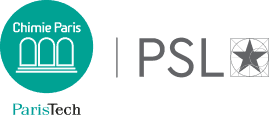European Projects H2020
Chimie Paris researchers are either leading or participating in numerous European projects in a wide variety of fields, a testament to the institution's scientific excellence in exploratory research, fundamental research or research with high technological potential.
The ERC (European Research Council)
The ERC (European Research Council) funds scientific excellence with grants. This program is dedicated to exploratory research. The ERC program offers four types of individual grants:
- The Starting Grant, for young researchers two to seven years after obtaining their thesis;
- The Consolidator Grant, for young researchers seven to twelve years after obtaining their thesis;
- The Advanced Grant, intended for experienced researchers;
- The Proof of Concept, to further valorization. This last grant is reserved for the ERC award winners.
The grant is for a duration of 5 years and the selection criteria are the scientific excellence of the project and the of researcher who leads it. Chimie ParisTech counts 3 award winners amongst its researchers.
ERC Advanced Grant: CINMAS, Corrosion Initiation Mechanisms at the Nanometric/Atomic Scale
The goal is to understand nanoscale/atomic corrosion initiation mechanisms on complex interfaces, with the ultimate goal of designing more robust metal surfaces.
Lead: Philippe Marcus
PE4, ERC-2016-ADG Start Date 2017-09-01
ERC Consolidator Grant: PhotoMedMet, Project Towards Novel Inert (Photo-)toxic Ru(II) Polypyridyl Complexes
PhotoMedMet is a project to develop new drug based on metals to fight against cancer and bacterial infections. More specifically, it looks into a prodrug-type approach in order to limit the frequently encountered side effects of anticancer drugs/antibiotics. In addition, some of the compounds prepared in this project are being studied as photosensitizers for photodynamic therapy.
Lead : Gilles Gasser
PE5, ERC-2015-CoG Start Date 2016-10-01
ERC Consolidator Grant: STRIGES, Escaping from the Franck-Condon region: a theoretical approach to describe molecular STructural ReorganIzation for reversible EnerGy and information storage at the Excited State
STRIGES is a theoretical project which aims to develop new computational approaches and descriptors based on the theory of density functionalities to design new molecular architectures that can undergo significant electronic and structural changes induced by light. To do this, adapted theoretical tools are developed, implemented and applied in order to obtain an accurate description of potential energy surfaces of excited states beyond the Franck-Condon region.
Lead: Ilaria Ciofini
PE4, ERC-2014-CoG Start Date 2015-11-01
FET-OPEN
Among the winners of the FET OPEN European calls for projects are Philippe Goldner with the NanOQTech project: Nanoscale Systems for Optical Quantum Technologies FET-OPEN-RIA 2014-2015: its objective is to build hybrid quantum devices on a nanoscale based on nanostructures in the solid state.
To learn more
Several research teams have been selected for the FET (Future and Emerging Technologies) programs. The objective of these European programs is to incubate, initiate and explore new multidisciplinary research areas that could lead to disruptive technologies in the medium to long term. As such, researchers at the school are heavily involved in the development of quantum devices.
Other actions
Chimie ParisTech - PSL teams are involved in the actions of the European community concerning the training and exchanges of researchers and future researchers, such as in the Marie Skłodowska-Curie actions. In this respect, we can mention the participation as a French node in the doctoral training network (ITN) Computational Spectroscopy in natural sciences and engineering COSINE and NATURE-ETN coordinated by Dublin City University.
COSINE Manager for Chimie ParisTech - PSL: Ilaria Ciofini
NATURE-ETN Participation of Chimie ParisTech - PSL : Gilles Gasser
The EU-funded NATURE-ETN project will create a network providing research training in the engineering of new biomaterials and therapies. The current research programme will include leading chemists and biologists in combination with technology and biotechnology partners. The network will use expertise in NA chemistry, DNA crystallography, materials chemistry, cell culture and epigenetic sequencing to develop a multidisciplinary environment to provide training to 15 early-stage researchers.
Researchers actively participate in several European networks, such as in molecular chemistry with the SSUCHY project: they are working on the development of bio-composites with advanced features for applications in transport, acoustics and electronics.
Manager for Chimie ParisTech - PSL : Christophe Thomas
